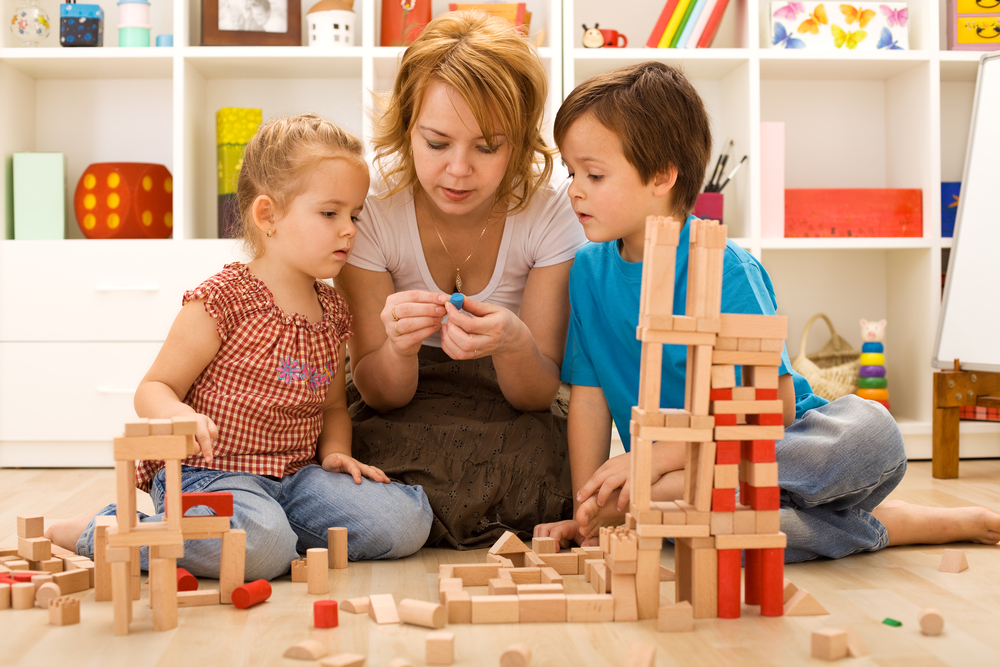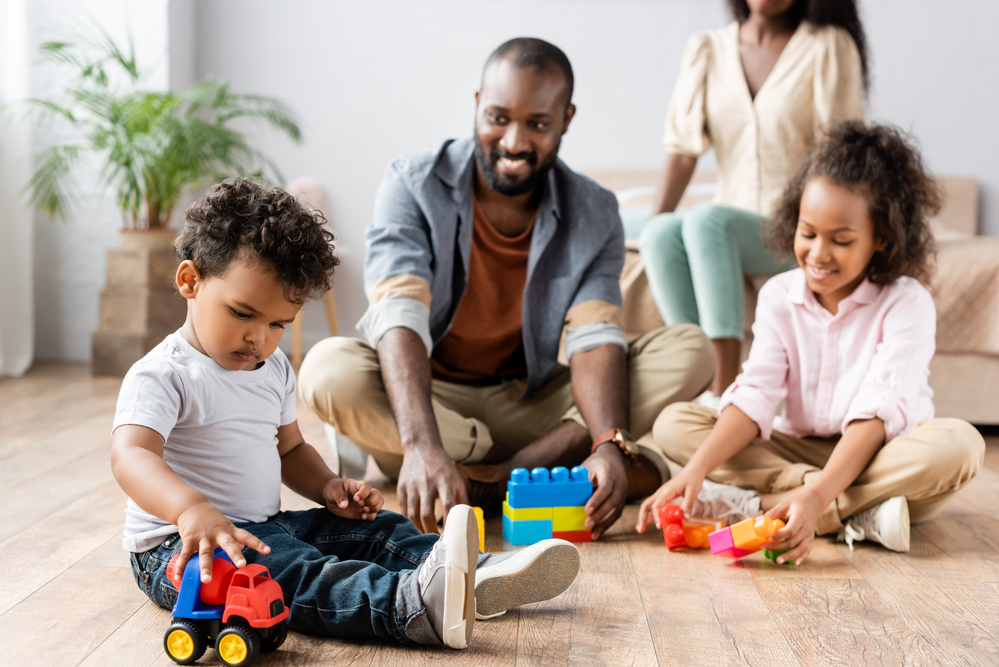We all know kids love to explore and play, but are some ways of playing better than others when it comes to learning through play? How is this style of learning different from regular child’s play?
Our experts at HOMER have compiled a comprehensive list of simple ways to get started with learning through play, plus tips to ensure your child thrives while they engage in various styles of play.
Let’s discover what learning through play means, what the benefits are, and how you can easily implement this valuable learning style at home.
What Is Learning Through Play?

While playtime might sometimes come across as unstructured or frivolous, it’s actually an important part of your child’s development and teaches them valuable life skills.
From playing with blocks to learning about balance and determining which shapes fit together to recognizing letters more easily, engaging in play can teach your child a lot about the world around them.
The many benefits of learning through play include:
- Improving communication skills
- Developing problem-solving abilities
- Teaching conflict resolution
- Nurturing creativity
- Encourages relationship-building
- Promoting independence
- Making meaningful discoveries about the world around them
- Motivating exploration
Stages Of Play

Learning through play comes in many forms and stages that will carry your child through their developmental years.
Starting with unoccupied play, this stage usually begins between birth and 3 months of age when children start to learn about their bodies and the simple pleasures of kicking their legs.
Solitary play is the next recognizable stage. You might notice your child using their focus to play alone with toys and their organizational skills to make sense of the activities they engage in. Playing alone is completely normal and necessary for development.
In onlooker play, your child may start to observe other children playing. Their brain is busy learning about how to interact with others.
Similarly, in parallel play, your child might play their own game or activity (like PlayDoh or cars) next to another child who is also playing — they’re playing separately, together.
When your child is ready, they’ll begin to engage in associative play. Here, your child gets to put the social skills they’ve been learning into practice by interacting with others. This might look like sharing materials for a craft project or building structures out of blocks together.
Finally, cooperative play is all about sharing resources and working together to achieve a common goal. This stage of play involves utilizing social skills and establishing rules, which can involve healthy conflict resolution and negotiation skills.
It’s important to note that the stages of play should be used as a guide and not hard-and-fast rules. Just because your child has ‘aged out’ of the solitary play stage doesn’t mean they won’t still enjoy it from time to time as they grow up.
Learning through play is about the engagement and enjoyment your child will experience in the moment rather than aiming for a particular end result — just enjoy the process!
Learning Through Play: Ideas By Type

There are many different ways your child can learn through play. We’ve compiled a list of ideas to get you started!
We’ve divided these ideas into categories based on different types of play, but remember they aren’t mutually exclusive — it’s possible to engage in multiple types of play at once.
These play ideas are great for children playing alone, with an adult, or with other children. It all depends on your child’s needs and what they enjoy!
Physical Play
Physical play involves developing motor skills and focuses on moving your body. Any activity that involves running, jumping, climbing, crawling, or practicing balance counts as physical play!
Try incorporating ball games, chasing balloons or bubbles, dancing to music, or creating an obstacle course in the backyard to encourage physical play among children.
Language Play
Children are developing their language skills every day, so encouraging language play is a fun way to build on what they’re learning.
Language play should begin with verbal play, such as riddles, rhyming games, and making up stories. Then you can move on to literacy-based language play, like what we offer at HOMER.
We’ve compiled lists of our favorite writing and spelling games to help you get started enjoying language play! Our Explore Letters Kit is another way to support your child as they develop their literacy and language skills through play.
From developing their imagination to fostering their early writing skills, our Explore Letters Kit acts as the perfect supplement to language play!
Exploratory Play

Children are inherently little explorers, so it’s no surprise that a key type of play is exploratory in nature! This play style is all about your child using their senses to learn about the world around them.
This can be as simple as playing with mud, making slime, creating figures out of PlayDoh, finger painting, or even playing with different textures of food (think squishy pasta versus hard potatoes).
Exploring outdoors with adult supervision is another simple way to get started.
Constructive Play
Constructive play gives children the opportunity to utilize their imagination, fine motor skills, and creativity.
It also provides an outlet for self-expression and teaches children that they can bring the pictures in their minds into reality!
Try drawing pictures with chalk on the sidewalk, building structures out of blocks, creating sock puppets, and using open-ended art materials such as paints, pencils, and paper to see what your child feels like creating.
Fantasy Play
Fantasy play (also called role-playing or imaginative play) is a fantastic way for your child to act out ideas they see in the world as well as make-believe scenarios they create all by themselves.
By incorporating costumes or pieces of material, figurines, puppets, and toy animals, children are free to explore and imagine without fear of judgment.
Fantasy play allows them to learn about various occupations such as doctors and firefighters, societal roles such as parents and caregivers, and fantasy scenarios such as adventures with superheroes and villains.
The possibilities are endless when it comes to fantasy play!
Social Play
Social play involves playing with others. This may be peers their own age, younger siblings, or older adults. It’s important for your child to learn to play with a variety of people and adapt to the needs of others.
This type of play is usually practiced during an additional style of play. For example, while engaging in make-believe play about cooking food or while playing a game of tag, your child will be practicing their social skills along the way.
Utilizing skills such as communication, negotiation, problem-solving, and cooperation is crucial in social play. As children learn and practice these skills, their ability to play in social settings will improve.
Our Explore Feelings Kit can help your child explore these new social skills in a fun, safe way! This specially designed kit provides your child with activities to foster their social-emotional skill development to promote positive interactions with others.
Quick Tips For Learning Through Play

Show Interest
Showing genuine interest in your child’s play activities is a great way to encourage further positive play experiences.
Talking to your child about their play preferences, asking questions, and getting involved when your child wants you to join in can show your child that you’re interested in and supportive of their play efforts.
Offer Support
You can set your child up for success in learning through play by offering support during challenging situations such as rejection or difficulty joining in with groups.
Navigate these challenges together by intervening only when necessary, discussing your child’s feelings, and providing strategies to approach situations differently in the future, such as offering to share with others.
Follow Their Lead
When it comes to making learning through play a positive experience, it’s important not to push your child into activities they may not feel ready for.
For example, if you’ve noticed your child isn’t taking an interest in playing with other children just yet, that’s OK! They will begin to observe and eventually participate in activities with others when they feel ready.
It’s equally as important to let your child make their own decisions when it comes to the type of play activities they want to engage in. If your child enjoys exploring more than they enjoy fantasy play, let them explore.
Learn Through Play With HOMER

Learning through play is an important part of your child’s skill development and can encourage creativity and imagination as well as learning.
By implementing the play ideas above — from language play to fantasy play and everything in-between — your child will be having so much fun they won’t even realize they’re learning valuable lessons along the way!
For even more fun learning activities, try our Explore Kits. They’re specially designed for children to encourage learning through play and act as the perfect tool to supplement free-play activities.
Happy playing!
,


